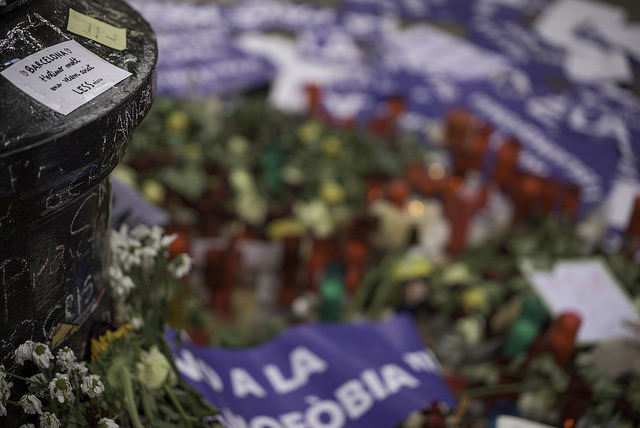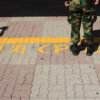
It cannot be defeated in the sense that the terrorism of ETA has been defeated, or the way the IRA and others have been beaten. Even in these cases the fight was protracted. With the Jihadists the struggle might take decades, or longer still since they refuse to entertain any idea of negotiating. It is absolutely necessary to defend our societies from this type of terrorism and violent radicalisation, to prevent them, to pursue and to tirelessly combat them, their effects and their causes, which are manifold and complex. This is in full knowledge that something might always fail, as on this occasion in Barcelona and Cambrils.
But the end can only come from within their own world. Despite the simplistic nature and ideological and theological poverty of Jihadi thinking, they fit into other broader strands of an Islam, or varieties of Islam, perpetually awaiting its Reformation and that is undergoing a protracted civil war, particularly in its Arab environment. Acknowledging this does not involve equating Islam with Jihadism or terrorism but it does point to a problem. Since the perpetrators of the attacks do not seem to be overly concerned about dying in order to kill, strengthening the legislation against this type of terrorism is of little avail.
Naturally, when it is our turn to suffer, the pain is all the greater, among other reasons because there is no sense of distance: in addition to its global dimension, the phenomenon is also homegrown. But it is not strictly Western, even though some of the assailants hail from Western societies. There have been many more deaths from this type of terrorism in the Muslim countries themselves than in the West. The University of Maryland’s Global Terrorism Database reveals that in 2016 only 238, or 0.7%, of the 34,676 people killed in terrorist attacks were located in Western Europe; these accounted for 269 incidents out of a total of 13,488, most of which (55%) took place in the Middle East and North Africa.
It is a mutating terrorism, which adapts depending on the type of countermeasures it is subjected to, and which, in the simplest of its manifestations, resorts to running people over and stabbings when it cannot cause blow them up. The same applies to the way it is organised. The cell that operated in Barcelona and Cambrils consisted for the most part of young men who were well-integrated and in work, recruited rapidly by the Imam of Ripoll, probably using the brainwashing techniques typical of cults. This raises fresh questions and doubts persist about the extent of their relationship with the Islamic State (ISIS or Daesh), both the organisation and the ‘brand’. We are already starting to see it metamorphose, following the loss of its caliphate in Syria and Iraq, into the virtual sphere –although with still with a tremendous physical effect– and we know that it possesses an unprecedented war chest that will enable it to continue funding attacks for a very long time in many parts of the world.
Jihadism represents a profound threat to our societies but –despite the references to Al-Andalus in the Spanish case– it is not an existential one, at least as long as it does not have access to chemical, bacteriological or nuclear weapons of any type (such as so-called ‘dirty’ weapons), potentially providing it with a capacity for mass destruction. It does however threaten our way of life, although Westerners accept the inconveniences inherent to ever-tighter security measures, and even if they harbour a certain degree of fear and call for more security, there is also a certain amount of resignation about the fact that the attacks will continue.
The citizens and administration in Spain at any rate have not been panicked by the attacks. They did not panic after 11 March 2004 in Madrid and have not done so now. Islamophobic currents did not emerge in Spanish society in 2004. This time, following the slaughter in Barcelona’s Ramblas and the revelation of the Imam of Ripoll’s cell, many more questions about Muslims have arisen, magnified by social networks that did not exist 2004. The connection between terrorism and Islamism has narrowed considerably in the minds of many members of the public in the wake of Barcelona –as in France after the attacks in Paris, Nice and elsewhere– despite the calls denouncing Islamophobia.
What there does need to be is a profound debate about the education and integration of second-generation immigrants, and the need to use legal means to force Muslim families to respect the equality of women –because an Islamic Reformation will only come from women, who are experiencing not so much a clash of civilisations as a clash of the sexes–.
Keeping tabs on the Imams is at the top of the agenda. And here, the Spanish Constitution may prove useful in consolidating and building up cooperation between the state and the organised religions mentioned in article 16, the authors of which were not thinking of Islam when they drafted it in 1978 but that may now encompass the funding and oversight of all religious teachings and the Imams. The census of mosques and Imams being drawn up by the Spanish Islamic Commission (CIE) is a first step that should have been taken some time ago, because it is problem that the authorities have been aware of for years.
In any event, this is going to be a merciless, lengthy, complex and sometimes painful fight that requires the utmost cooperation between all the security forces, both national and international, the intelligence services and members of the public. Divisions deriving from other issues, such as the tensions surrounding Catalan independence, undermine the fight. Nor can it be denied that Western policy towards what has been happening in the Arab and Islamic world –externally and internally– has often, although not always, been ill-judged, something that has helped to keep the monster alive.


